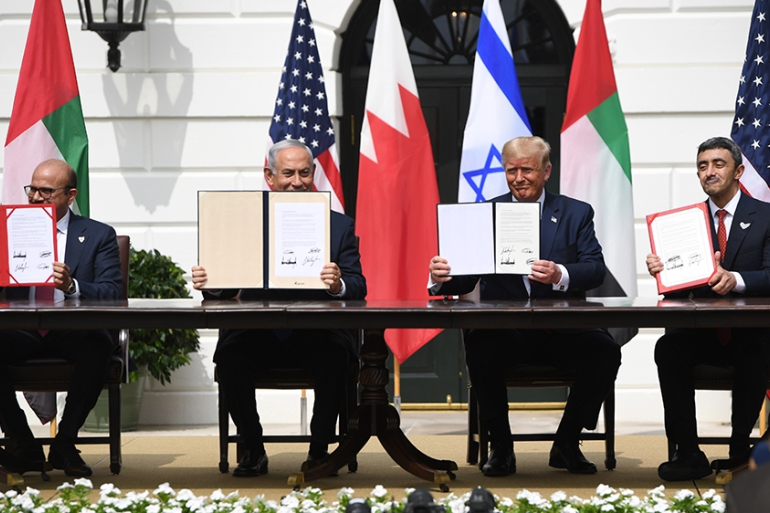
Quietly pursued over the past decade or more, long-standing ties between Israel and Gulf states have become public, based on national interests, with speculation that adversarial relations could move into some loose regional alliance system. Building on the historic Joint Agreement signed between Israel and the UAE in August 2020, the Abraham Accords are a framework for normalizing diplomatic relations between Israel, the UAE and Bahrain; noticeably, they are not based on first resolving the Palestinian-Israeli conflict. This agreement defines paths towards establishing embassies, building diplomatic, cultural, and economic ties. Specific areas of common interchange are likely to include cyber-security, trade, artificial intelligence, intelligence sharing, water management, and many other technological fields. Israel and the UAE are common hubs for research and development.
Notably, Israel and the Emirates commenced commercial flights between their countries for the first time. The agreement is based on national interests, central to which are common fears against the hegemonic intentions of Turkey, Iran, and, beyond the region, the slow intrusion of Chinese presence in the Middle East. Officials from the three countries who commented on motivations for the agreement noted common concerns for the decade-long Arab state internal convulsions caused by onerous economic decline, exasperating COVID-19 issues, massive displaced populations, and pockets of perennial corruption existing in pandemic proportions.
Departing from past content that unfolded into Arab-Israeli treaties or accords, these agreements did not include a promised Israeli withdrawal from territories to benefit the PLO or the Palestinian Authority. This agreement did not include any mention of the UN or EU resolutions. It did not include any requested preconditions other than an Israeli promise not to annex West Bank lands it aquired in the June 1967 war. Israeli, Arab writers and many analysts have internalized the reality that the Palestinian political leadership continues to be sclerotic, divided, dysfunctional, and highly autocratic. More frequently since the middle of August 2020, scholars and writers have commented vigorously that the “Palestinians Repeat the Same Mistakes,” by once again procrastinating in not entering into some form of negotiations.
This is not new for the PLO. The Yassar Arafat led PLO refused joining peace negotiations when repeatedly squired by the Carter administration forty years ago. . According to an extensive oral interview with US Ambassador to Israel Samuel Lewis, (1977-1985). Egyptian President Anwar Sadat did very little little to persuade the PLO to join negotiations in the 1977-1980 period. Sadat left it to the Americans, and particularly Carter’s National Security Adviser, Zbigniew Brzezinski to persuade Arafat to join talks, recognize Israel, renounce terrorism, and become part of Carter’s comprehensive peace effort. Sadat knew that Arafat was incapable of accepting Israel. Accordingly, Sadat told his higly disappointed Egyptian foreign ministry advisers at Camp Davdi that he was not going to wait for Arafat or the PLO to spoil the territorial fruits of negotiations with the Israelis—Sinai’s return without settlements. Lewis reminds us that there was more than considerable interest among West Bank Palestinians to engage before and after the September 1978 Camp David negotiations, but “they were under severe pressure from the PLO’s successful propaganda, not to participate in the Palestinian (self-governing) autonomy negotiations.” PLO official Nabil Shaath, during an interview with me in Cairo on October 2, 1988 explained why the PLO did not join the 1978 negotiations—“No matter the faults of Camp David, it gave us an opportunity to have our legitimate rights considered. We were not prepared.” Arafat was not ready. Further irrefutable evidence of PLO and Arafat turning down American overtures in the 1980s is found in detailed oral interviews with high ranking American State Department officials who made repeated efforts to secure Arafat’s and Palestinian engagement in American led negotiations: Wat Clevurius, Morris Draper, John Kelly, David Mack, Tom Pickering, Nick Veliotes, Dick Viets and others.
Resolving the Palestinian-Israeli conflict is no longer the obstacle to fostering Middle Eastern state-to-state relationships. With the UAE-Israel-Bahrain agreement to build on, Arab states can more broadly initiate contacts with Israel—not based on ideology or artificial restraint but on enhancing mutual strategic interests. Perhaps a loose alliance system with common objectives could evolve, one where Washington or the EU could play a cementing but not intrusive role, fostering common connections between states in the region. This could be a wise policy consideration for the next US President, regardless of who occupies the Oval Office in January 2021.
Ken Stein
September 27, 2020
